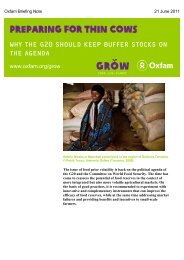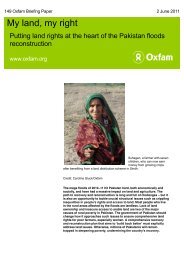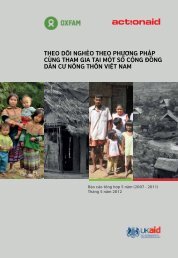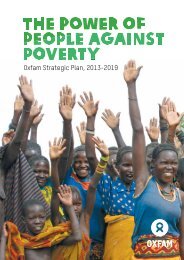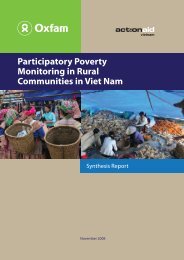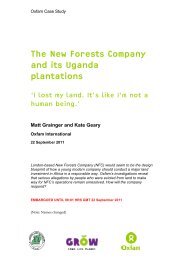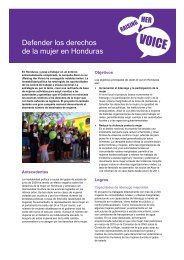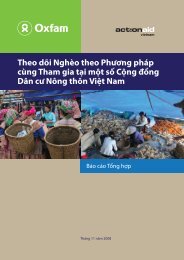Challenges to Rural Poverty Reduction in Viet Nam - Oxfam Blogs
Challenges to Rural Poverty Reduction in Viet Nam - Oxfam Blogs
Challenges to Rural Poverty Reduction in Viet Nam - Oxfam Blogs
Create successful ePaper yourself
Turn your PDF publications into a flip-book with our unique Google optimized e-Paper software.
14<br />
and improve moni<strong>to</strong>r<strong>in</strong>g and evaluation systems, develop concrete regulations<br />
so that people and communities can practice their supervisory rights. Target<br />
social security based on multi-dimensional poverty criteria rather than the<br />
<strong>in</strong>come poverty l<strong>in</strong>e.<br />
4. To design policies that both do not discrim<strong>in</strong>ate aga<strong>in</strong>st migrants and actively<br />
support them <strong>in</strong> their efforts <strong>to</strong> f<strong>in</strong>d and secure safe employment.<br />
5. To encourage <strong>in</strong>vestments <strong>in</strong> education <strong>in</strong> models such as “Semi-board<strong>in</strong>g<br />
general schools”, “Staff support<strong>in</strong>g teachers”, “Bi-l<strong>in</strong>gual education” for<br />
k<strong>in</strong>dergartens, and “Education and community development - Reflect”. Issue<br />
specific regulations on additional contributions, both compulsory and “optional”,<br />
<strong>in</strong> order <strong>to</strong> reduce the costs of send<strong>in</strong>g children <strong>to</strong> school. Develop concrete<br />
regulations <strong>to</strong> improve the roles of parent’s representative boards <strong>in</strong> supervis<strong>in</strong>g<br />
the school’s affairs. Increase vocational counsell<strong>in</strong>g services <strong>to</strong> enable students<br />
<strong>to</strong> select courses that will help then f<strong>in</strong>d employment on graduation.<br />
6. To reform agricultural extension services <strong>in</strong> mounta<strong>in</strong>ous ethnic m<strong>in</strong>ority areas<br />
that are more beneficial <strong>to</strong> the poor. Replace conventional tra<strong>in</strong><strong>in</strong>g methods<br />
and models with participa<strong>to</strong>ry approaches such as “Farmer Field Schools<br />
(FFS)”, “Participa<strong>to</strong>ry Technology Development (PTD)”, “Farmer <strong>to</strong> Farmer”.<br />
Provide specialised tra<strong>in</strong><strong>in</strong>g, <strong>in</strong>creased allowances and direct support for<br />
the establishment of demonstration models for village agricultural extension<br />
workers. Encourage gender analysis and gender ma<strong>in</strong>stream<strong>in</strong>g <strong>in</strong> agricultural<br />
extension. Increase the budget for agricultural extension projects aimed at<br />
improv<strong>in</strong>g and chang<strong>in</strong>g the livelihoods of the poor, pay<strong>in</strong>g special attention <strong>to</strong><br />
low-cost <strong>in</strong>vestment models, suitable <strong>to</strong> conditions and livelihood strategies of<br />
poor ethnic m<strong>in</strong>orities.<br />
7. To undertake comprehensive <strong>in</strong>vestment (e.g. <strong>in</strong> the form of Community<br />
Development Fund - CDF) <strong>in</strong> poverty reduction programmes at the commune<br />
level via a decentralized f<strong>in</strong>anc<strong>in</strong>g mechanism with community ownership (i.e.<br />
“block grant”), along with substantial and cont<strong>in</strong>ued assistance <strong>in</strong> enhanc<strong>in</strong>g<br />
participa<strong>to</strong>ry socio-economic plann<strong>in</strong>g, f<strong>in</strong>ancial management and communitybased<br />
supervisory capacities. Recommendations obta<strong>in</strong>ed <strong>in</strong> participa<strong>to</strong>ry<br />
plann<strong>in</strong>g exercises at the grassroots level should be consolidated and reflected<br />
<strong>in</strong> plans <strong>to</strong> deliver public services (e.g. agriculture, agro- extension, and<br />
education, health, and water supply services). To <strong>in</strong>stitutionalize the participa<strong>to</strong>ry<br />
socio-economic plann<strong>in</strong>g approach and regulation on the use of decentralized<br />
f<strong>in</strong>ancial at commune level, based on experiences and lessons learned from<br />
some prov<strong>in</strong>ces tak<strong>in</strong>g part <strong>in</strong> this <strong>in</strong>itiative over the past years. Tools promot<strong>in</strong>g<br />
the voice and empower farmers should be applied widely (such as “Citizen<br />
Report Card”, “Community Score Card”, and “Social audit<strong>in</strong>g”).



